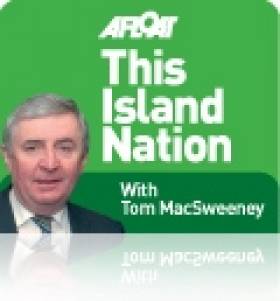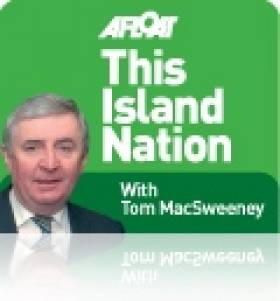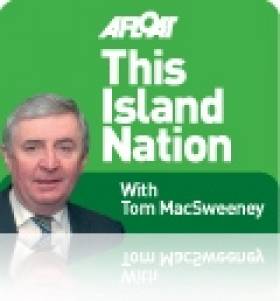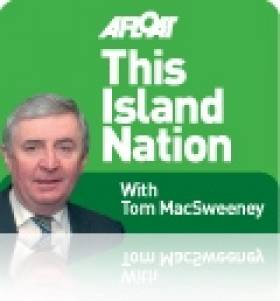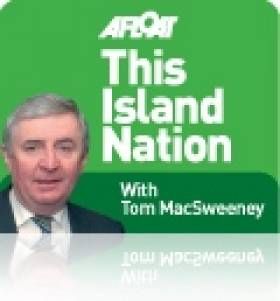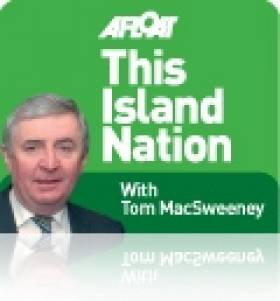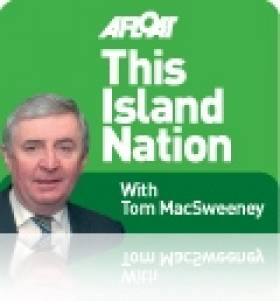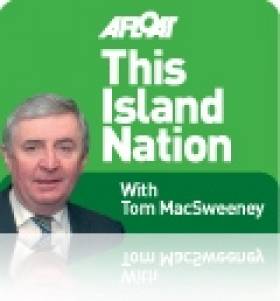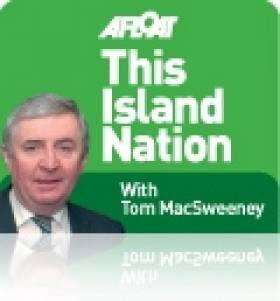Displaying items by tag: Island Nation
This week on THIS ISLAND NATION .... Dublin is the cradle of yacht racing, or is it? ... In shipping the United Nations is warned about dangers to passengers aboard cruise ships ... Environmentalists are accused of trying to damage the seafood industry ... The Boyne sea-going currach and what it means to Irish maritime history.... and Argentina's tall ship defeats greedy American bond-holders.
DUBLIN BAY IS THE CRADLE OF YACHT RACING
Yachting historian Hal Sisk is certain to raise debate in sailing circles with his provocative but, he maintains, very accurate claim that "the relevance of early yachting to our modern sport of yacht racing is negligible."
"Yacht clubs," he says, "delighted in contriving tenuous links with previously defunct clubs to boost their status, imagining that their members were proud successors in an unbroken tradition to named yacht owners of the past."
To whom or who is he possibly referring?
That will form interesting debate about his new publication "Dublin Bay, the Cradle of Yacht Racing," from Peggy Bawn Press, through which he has provided some magnificent books on sailing history. In this one he discusses amateur competitive sailing: "Where and when did our sport emerge? Who took the lead? Who wrote the rules?" he asks and then proceeds to answer the questions with his view that the worldwide sport of yacht and dinghy racing was popularised and formatted by "the pioneering yachtsmen of Dublin Bay."
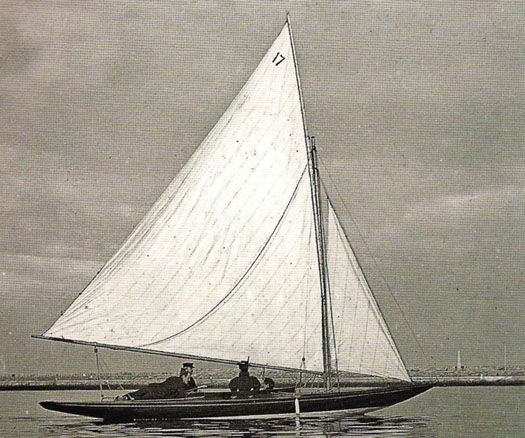
A one rater in Dublin bay in the mid 1890s from Hal Sisk's new book
Well worth reading – and discussing over the Christmas period – though I think his views will resonate for a lot longer! Hal is a great devotee of the sport of sailing and a doyen amongst those who debate the history of going afloat
He pays strong tribute to the Royal Alfred Yacht Club for its work in starting the sport of yacht racing: "No club achieved more in shaping the worldwide sport in its formative period than Dublin's Royal Alfred YC, Wherever amateur sailors are coming to the line, racing under nationally agreed regulations, they are sailing in the wake of the pioneering yachtsmen of Dublin Bay."
Shipping – UNITED NATIONS WARNED ABOUT CRUISE SHIP SAFETY
Major shortcomings in existing safety regulations for passenger ships have been raised in a series of technical papers tabled by the UK Government at the International Maritime Organisation, the United Nations body responsible for safety at sea. The papers raise fundamental questions about the risk factors used to assess stability requirements for passenger ships and cast doubt over the 'safe return to port' principles which underpin the latest SOLAS (Safety Of Life At Sea) requirements. The UK has also expressed concern over existing rules governing the closure of watertight doors and recommends much stricter controls over their opening.
The international shipping officers' trade union, NAUTILUS, has backed the UK Government's documents which have been submitted to the IMO's Maritime Safety Committee in response to an initiative to re-examine the safety of cruise ships in the wake of the Costa Concordia disaster. This initiative has been started by the Secretary General of the IMO, Koji Sekimizu.
Marine Environment – ENVIRONMENTALISTS ACCUSED OF DAMAGING IRISH SEAFOOD INDUSTRY
While anglers and environmentalists have fears about the impact of sea lice from fish farms on wild fish, the call by environmental organisations for a boycott of Irish smoked salmon at Christmastime is a step too far in their campaigning. There are on-going battles over proposals for a large farm development in the Bantry Bay area and the State fisheries board, Bord Iascaigh Mhara, is at loggerheads with opponents over its plans for a big farm offshore of Galway Bay. The debate about sea lice has been going on for many years and there are strong arguments on both sides. There are vested interests on both sides, but the reality is that the vast majority of salmon eaten in Ireland, whether at home or in catering establishments is farmed, whether Irish-produced or imported from abroad. There is very little wild caught salmon now available for consumption and the cost is beyond the level of most people. In the future there is no doubt that aquaculture will provide more of the world's fish consumption. Whatever the rights and wrongs of this debate, to deliberately damage the reputation of the Irish seafood industry is a step too far and to call for a boycott of Irish smoked salmon products this Christmas is an attempt to damage businesses and jobs. It is unacceptable and the environmentalists responsible for suggesting this should withdraw their attempt to damage Irish products.
Maritime History – BUILDING A SEA-GOING CURRACH ON THE BOYNE
On what type of craft did the earliest settlers arrive in Ireland?
A currach-maker on the banks of the Boyne has been spending a lot of time and effort trying to answer that question. He has been working on a 36ft. craft of a style and sturdiness that might have been the type of vessel involved. If he is correct, he also believes that this type of boat may have been used to transport the giant stones that were used to build the great passage tomb at Newgrange.
Claidhbh Ó Gibne is the man providing insights into how large sea-going craft may have been constructed in prehistoric Ireland.
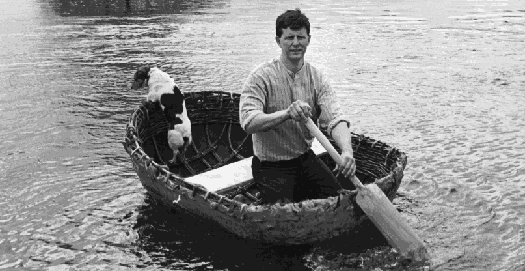
Claidhbh O Gibne in his first currach on the Boyne with his companion Jack Russell
Living on the banks of the Boyne Claidhbh Ó Gibne became intrigued with the river's distinctive traditional currach, because of its simplicity of form and, through its raw materials, direct connection with the earliest journeys undertaken by the people of the Europe who arrived on Irish shores. The Boyne Currach Centre, opened in 1997, was a huge achievement in his life and is where he has produced different prototypes of sea currachs made from tanned cowhides and hazel baskets. The Boyne currach is the last remaining wicker craft woven from hazel rods, covered with animal skin and regarded as Ireland's smallest currach. Written accounts show it being used from the 1360s.
"Although this small wicker craft became synonymous with the River Boyne, as it was an ideal vessel for trapping salmon, it also holds the thumbprint for reproducing the greater ocean-going crafts of which there are many recorded accounts throughout our history," he says. So he began building currachs from organic materials which had been widely used over thousands of years, moulding and shaping rawhide, sinew, leather, hazel, feather and bone.
• Claidhbh Ó Gibne's book, 'The Boyne Currach, from beneath the shadows of Newgrange,' is in the bookshops.
Tall Ships – ARGENTINA GETS UNITED NATIONS BACKING TO RELEASE TALL SHIP
A United Nations court has ordered the immediate release of the Libertad, Argentina's naval training tall ship which has been detained in Ghana for two months after a USA court decision in favour of bond holders who claim that Argentina has defaulted on loans it owes them. Argentina appealed to the U.N.'s International Tribunal for the Law of the Sea for the ship's release, arguing that as a warship the Libertad is immune from being seized. The court ordered that Ghana "forthwith and unconditionally release the frigate ARA Libertad" and ensure the ship and its crew can leave Ghanaian waters. It also ordered that the vessel be resupplied as needed.
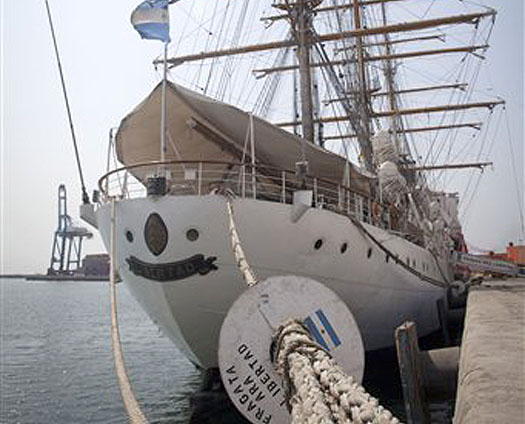
Libertad held in Ghana
Argentina hailed the decision and vowed to continue fighting what President Cristina Fernandez has called "vulture funds," with which the country is locked in a series of legal battles.
Cayman Islands-based NML Capital Ltd. owned by American billionaire Paul Singer is leading a group demanding payment in full, plus interest - about $350 million - for dollar-based Argentine bonds bought at fire sale prices after Argentina's 2001-2002 economic collapse forced a sharp devaluation of its currency. The vast majority of bondholders accepted about 30 cents on the dollar years ago, and that is roughly what the holdouts led by Singer initially paid for the bonds. This is an example of the greed of bond holders.
NML criticized the U.N. Law of the Sea Tribunal for making the ruling. Argentina's Defence Minister, Arturo Puricelli, said at a news conference in Buenos Aires that a charted plane would deliver 98 more sailors to Ghana this week to join the skeleton crew that stayed with the Libertad, to which power and water supplies had been cut off. He estimated the sailing ship could return to Buenos Aires by Jan. 9
Email: [email protected]
Regular news from Tom MacSweeney on Twitter: @TomMacSweeney
Fish Stocks Up, Coastal Communities Face Losses & Figaro Race Not Sailing to Ireland
This week on THIS ISLAND NATION .... Fishing coastal communities could face €50m. losses .... a 9,000-mile voyage with no one aboard the vessel .... More seafarers lose their lives .... A 3-year whale and dolphin plan ... An eerie fish caught on the East Coast .... and more...
IRISH FISH STOCKS BETTER THAN EVER BEFORE – BUT FISHING COMMUNITIES COULD FACE €50m. LOSSES
There has been an improvement in the state of fish stocks according to the Minister for the Marine. Based on the Sea Fisheries Sustainability Impact Assessment carried out by the Department of the Marine; Bord Iascaigh Mhara, the State Fisheries Board and the Marine Institute; of the 59 stocks in which Ireland has a share of the EU TAC, 42% are now fished sustainably compared to 36% in 2011.
"While many stocks in which the Irish fleet have an interest are not in a healthy biological state, there has been an improvement in 2012 on the state of fish stocks," says Minister Coveney. "The state of the resource base, in terms of the biomass and the population of mature fish in the stock, has also improved. The number of depleted stocks has declined from 12 to 8. Further efforts are needed both in terms of setting TAC levels and taking other measures such as reducing catches of juvenile fish and dealing with unacceptable levels of discards. These issues will be a priority for me during the Irish Presidency work programme on the reform of the Common Fisheries Policy in the first half of 2013"."
However, contrasting with this good news, there could be problems ahead for coastal communities during negotiations on annual TACs and quotas which will take place at the EU Commission in Brussels from December 18 to 20. This is the annual haggling over catching rights, a ridiculous time of the year in which to hold these discussions when there is far too much pressure within the available timeframe.
"From an analysis undertaken by BIM the current EU proposals would have significant consequences on our fishing industry and our dependant coastal communities. Potentially there is a loss of approximately €15.5m for our whitefish and prawn fishing industry as well as knock-on effects for processors, hauliers and others. This equates to losses in the order of €53m for coastal communities where the direct cost and indirect costs -processing, net making and others are taken into account".
Shipping – MORE SEAFARERS DIE
The dangers of life at sea were shown again this week when eleven seafarers died in the cold waters of the North Sea. But it seemed to me to be like just another statistic, with brief news media coverage, just more dead sailors and their families left to grieve. Those who died were mainly Polish, including the Captain, Filipinos and Ukrainians, in the frigid waters when the 148-metre (485ft) Baltic Ace, carrying a cargo of cars and registered in the Bahamas, sank after colliding with the 134-metre (440ft) container ship Corvus J, registered in Cyprus, in darkness near busy shipping lanes some 65 kilometres (40 miles) off the coast of the southern Netherlands. The cause of the collision is not known. The crew of 24 of the Baltic Ace abandoned ship. The Corvus J was heavily damaged and, after assisting in the search for survivors, went to Antwerp where an investigation began and the ship was assessed for repairs. Responsibility for investigating the collision lies with the States under whose flags the ships were sailing - the Bahamas and Cyprus - because the collision happened outside Dutch territorial waters
A ROBOT ON THE OCEANS
What does this mean for the future of ocean voyaging? A wave-powered robot, Papa Mau, has completed a 9,000-nautical mile journey from San Francisco, California, to Australia in just over a year. California ocean data company Liquid Robotics created the robot.
"It weathered gale-force storms, fended off sharks, spent more than 365 days at sea since November of last year, skirted around the Great Barrier Reef and finally battled and surfed the east Australian current to reach its final destination in Hervey Bay near Bundaberg, Queensland, Australia," said Bill Vass, CEO of Liquid Robotics. The company pioneered and developed the Wave Glider, wave-powered autonomous robot to gather and transmit scientific data on waves, weather, salinity, water temperature, and dissolved oxygen. It took energy from ocean waves and had solar panels for computing navigation and to power its sensors.
Liquid Robotics said the robot travelled through and measured more than 1,200 nautical miles of chlorophyll bloom along the equatorial Pacific. These blooms indicate proliferation of phytoplankton that is fundamental to ocean life and climate regulation. Phytoplankton are microscopic plant-like organisms that provide food for other marine life and play a key role in consuming carbon dioxide during photosynthesis. While satellites can monitor chlorophyll blooms, Liquid Robotics suggested its technology can provide images of the phytoplankton in more detail for marine and climate change scientists. The company has a second ocean robot also destined for Australia where it is expected to land early next year. Two other robots are heading for Japan, but one of them, Fontaine Maru, has been damaged and has been sent radio instructions under which it is returning to Hawaii to be repaired.
Naval – IRAN HAS THE BLUES
Iran has unveiled a bright blue submarine. It was shown during a broadcast on the country's state television, KSPR, leaving Naval experts around the world discussing the reason for its unusual colour. "It may be that it is intended to be less visible from the air in the clear waters of the Gulf," said some, but others pointed out that green was selected for two other recently-completed Iranian submarines. Another suggestion is that it is an Iranian publicity stunt to highlight to the world that it has the ability to build submarines, even if they look old-style from the pictures. Iran has said it will test its new submarines in the Persian Gulf and then send into the Atlantic!
Keep an eye out!
Sailing – FIGARO NOT FOR IRELAND
The route for next year's French Figaro race has been announced at the Paris Boat Show and does not include an Irish port. It will start on June 2 from Bordeaux, the first time the city has hosted the race. Two legs will follow the Bordeaux start visiting Spain and Portugal before the race returns to Roscoff on the northeast coast of Finistere, which has not hosted the race before and finishes in the Normandy port of Dieppe, which was previously included in the race in 2009 and 2011.
Cork sailor David Kenefick is continuing his rigorous training progamme in La Grande Motte for the race. He will take a two-week Christmas break, Brian Carlin who is part of his team, told me. "In the New Year his training will intensify with 3 weeks on and 2 weeks off until March. Since the launch of his campaign there has been a huge level of support. A lot of people are behind David. It's great to see." (A profile of David appears in the Island Nation column of the 2013 Afloat annual in shops next week).
WATCH THE BOAT !
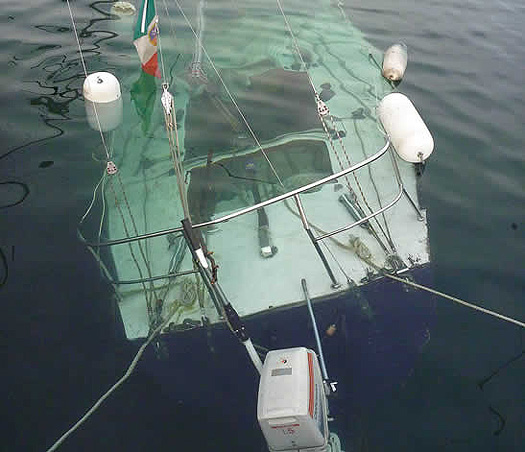
If you are keeping your boat in the water this winter and it seems there are quite a few owners who are trying to save on boatyard costs in these recessionary times, then be sure to check it regularly. So a reader suggests when sending me the above photograph of a boat which has gone underwater. "You wouldn't want your boat in this condition," he warns.
Angling – WHAT AN EERIE FISH !
"Incredible photos of a conger eel caught on the East Coast," Paul Bourke, Angling Information Officer with Fisheries Ireland tells me and so they are.
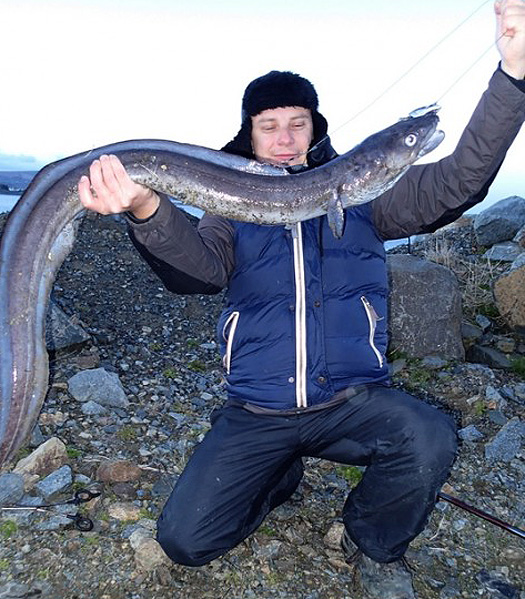
David Muirin of East Coast Fishing provided the photos to Fisheries Ireland and I gather that the East Coast has a dozen harbours, small and big, where a good population of congers are present.
Marine Environment – THREE-YEAR PLAN FOR WHALES AND DOLPHINS
The sight of whales breaching off West Cork in the past few weeks has been magnificent. The Irish Whale and Dolphin Group, established twelve years ago this month, is developing a three-year plan for its work "dedicated to the conservation and better understanding of whales, dolphins and porpoises in Irish waters through study, education and interpretation."
This week the Group has been carrying out a biopsy sampling of the humpback whales off West Cork. "From the images so far collated we can confirm that there are in total six humpbacks associated with this activity, two of which have already been biopsied and all have previously been recorded in Irish waters," according to IWDG Sighting Co-ordinator, Padraig Whooley. In order to assess the success or otherwise of refloating live stranded cetaceans, the IWDG has been promoting the tagging of refloated animals and, in collaboration with Galway/Mayo Institute of Technology, has purchased tags and been granted a licence for three years to tag a sample of cetaceans considered good candidates for refloating.
One of the issues which the Group has been considering is the public reaction to the live stranding of the fin whale in Baltimore this summer. There was public upset about its suffering and the length of time it took to die. The IWDG has been reviewing the euthanasia of large whales and there are likely to be discussions with the Naval Service and the Army about procedures to deal with any similar case in the future.
SHIPPING CONTAINERS MAKE WOMEN'S HOUSING
Canada is the latest country in which unused containers are being used for housing. Twelve are being turned into a social and affordable housing project for homeless women in Vancouver.
Email: [email protected]
Regular news from Tom MacSweeney on Twitter: @TomMacSweeney
#islandnation – This week on THIS ISLAND NATION .... coastal communities beat Coast Guard management for the second time; when will the Government realise the economic value of sailing; sea snails have an acidic message; shipping emotion; seafood is doing well..
TIME FOR COAST GUARD MANAGEMENT TO CONCENTRATE ON SERVICE
For the second time management of the Irish Coast Guard has been defeated in their attempts to close the coastal radio stations at Malin Head and on Valentia Island. Sense has prevailed and safety of life at sea has been recognised as more important than bureaucracy. It is a victory for the good sense of coastal communities and recognition of the vital importance of local knowledge when life is in danger at sea as well as the importance of routine day-to-day operations of maritime radio.
The decision is commonsense as well as recognising that whoever closed the stations could face serious criticism should it result in controversy as a result of any subsequent loss of life at sea.
Minister for Transport Leo Varadkar in announcing his decision, appeared to be disgruntled about the manner in which the Oireachtas Joint Committee on Transport and Communications questioned Coast Guard management at a hearing about the issue. In his Dail statement he said the reviews into the Coast Guard services are ongoing, but he wanted to assure local communities that the three coastguard centres would not be closed. He said he was disappointed at the treatment of officials from his department at the Joint Committee meeting and claimed that there were a small number of members whose contribution was deeply unfair and unjustified.
It was this Committee which revealed several serious issues about the way in which the Fisher Report about the Coast Guard was handled, matters which still require an answer into the transparency and independence of examinations of State services.
It was revealed at that Oireachtas hearing that the original draft of the report had recommended what the Minister has now approved, that both Valentia and Malin remain open, but this was changed subsequently. By whose pressure and for what reason has not been disclosed. Who interfered with the consultants' report at that stage and sought to change it? Where is transparency and accountability to the public interest in that regard? Neither has Coast Guard management explained why the recommended upgrading of the stations was delayed after the last failed attempt to close them in 2009?
The battle to protect Malin and Valentia does not in any way reflect on the work or value placed of the Dublin radio base, but the correct decision is that there should be three stations working together for the benefit of saving life at sea and maritime radio communications in the widest sense. Coast Guard management was, once again, wrong in what it tried to do and should now learn its lesson. There was even an original proposal this time to replace Malin and Valentia with a station in the Minister's own constituency, at Blanchardstown. It would be difficult for any politician to defend such a proposal.
I have seen the complete Fisher Report and the responses of Coast Guard management to it, from which there are questions remaining to be answered.
It is now time for senior management to concentrate on responding by developing the service in the best interests of safety of life at sea and stop trying to close Malin and Valentia coastal radio stations.
Shipping – EMOTION MIXED WITH MEMORY
Through the windows of the Cork Port company's board room I could see the branches of the Christmas trees swaying in the wind as the weather brought in the first signs of an impending gale, with rain driving down on a ship moored across the river. The words of Fr. Christy Fitzgerald came across the room: "In this weather who would want to be a seafarer? Who would like to be on a ship in tough weather conditions like today, out at sea, where crews are dependent entirely on themselves? It is a calling that many people would not do. There are families today who will be thinking about the conditions in which their family members may be at sea somewhere in the oceans of the world. We need seafarers, let us remember them.
Then, across the room came the singing of the congregation and the words: "Eternal Father strong to save, whose arm hath bound the restless waves, o hear us when we cry to thee, for those in peril on the sea."
I was at the annual ecumenical remembrance service for seafarers organised in Cork by the Southern Branch of the Maritime Institute of Ireland, an emotional, evocative occasion as the names of those who had died in the past year on the southern coastline were remembered. It was the biggest turn-out I have seen at the ceremony in recent years, with all maritime organisations, professional and leisure, represented. I thought of those who in Dublin at the same time would be holding the national ceremony to remember seafarers at the memorial on City Quay.
We should always remember and appreciate seafarers.
Sailing – VOLVO ECONOMIC LESSON
The enormous economic benefit which a well-developed national sailing approach could yield for Ireland is shown in the report about this year's Volvo Race in Galway. Compiled by the J.E.Cairnes School of Business and Economics at NUI Galway it has shown that the event was worth €60.5 million to the economy. Over 500,000 visitors attended events during the race festival from June 30 to July 8, of which 16 per cent came from outside Ireland. The organisers and Galway City invested €7.6m. so the overall nett benefit was considerable.
"The magnitude of the event in terms of the economy of the Galway area was exceptional," said Dr.Patrick Collins of NUI Galway's Whitaker Institute. "Direct expenditure was €35.5 million, with indirect spend of €25m."
There was discussion after the previous Volvo visit in 2009 about what legacy it would leave behind for prolonged benefit. Now there is a second confirmation of the value of sailing as an economic earner. Yet our Government fails to adequately support such commitment.
SUFFERING THE CARIBBEAN!
While Irish weather is chilling the bones and wetting the bodies four Cork sailors are in much better weather, taking part in the ARC, the annual transatlantic rally from Las Palmas de Gran Canaria to Rodney Bay at Saint Lucia in the Caribbean. Royal Cork YC member Aidan Heffernan has the crew of Joleen Cronin, Denis Nagle and John Hanley aboard his Dehler 36 Indulgence which he races in Cork Harbour and along the south coast. There are 200 boats altogether taking part in the 2,700-nautical mile event which is regarded as "a friendly race for cruising yachts" and can take between 14 and 21 days to complete, depending upon weather conditions.
Fishing – SEAFOOD FOR THE FRENCH
Despite the recession the Irish seafood sector is doing reasonably well, "holding its own" I am told from the industry. Sales reached an estimated €749 million last year. For the first half of this year exports are up 20 per cent in value to €253m. compared with the first half of last year. The latest development is that Breizon Ltd., an Irish seafood company in Connemara has established a joint venture company with two French partners based in Lorient. Bord Iascaigh Mhara (BIM) has assisted the development of the new venture which will involve an agreement with Keem Bay Fish Products to supply seafood (shellfish from Breizon and smoked seafood from Keem) to meet increasing demand in the French market. The joint operation will deliver fresh Irish seafood direct to retailers, restaurants and fishmongers. The French partners are Argis Galacsea and Les Viviers de Keroman in Lorient.
BIM Chief Executive Jason Whooley said there are 180 registered seafood companies now with processing facilities in Ireland. While many Irish operations are small-scale with turnovers between €3m. and €10m., European competitors have a turn-over five times that. Lack of scale is the biggest factor regarded as limiting the profitability of the Irish seafood sector. BIM says it is working with the industry to support business development.
Environment – ACIDIC SEAS ALERT
The shells of some marine snails are dissolving as the seas around Antarctica become more acidic. That is according to a study published in the journal, Nature Geoscience. As CO2 levels in the air increase from the burning of fossil fuels, so the seas are becoming more acidic.
DOLPHIN DILEMMA
There are around 195 bottlenose dolphins permanently on the East Coast of Scotland who regularly feed in the Moray Firth Special Area of Conservation where they are a tourist attraction. Scientists studying them have concluded that the small and isolated nature of their population makes them prone to being disturbed so organisations have joined forces to understand the impact of boat movements.
A computer model has been developed by the University of Aberdeen to predict effects on dolphins from planned offshore renewables facilities at Nigg and Whiteness and associated vessel movements. Tour boats and other marine traffic have also been assessed and the results show that boats which behave predictably are less likely to have an adverse effect on dolphins compared to those which follow the animals. The results were published this week by the Scottish Natural Heritage organisation.
Email: [email protected]
Twitter: @TomMacSweeney
Shipping Shock, Figaro, Tall Ship Crew, Dead Sailors & Seaweed Kayaking
#islandnation – A major world shipping shock, a Corkman Figaro-ing, a tall ship crew drawing their guns in port, remembering 235 dead sailors in Donegal, seaweed kayaking and an Irish Volvo crewman goes it alone around the world, all in your THIS ISLAND NATION round-up this week.
SHIPPING INDUSTRY SHOCK
More than a thousand ships owned by Maersk sail the world's oceans every day, so the decision by this huge Danish conglomerate, A.P. Moeller-Maersk, not to continue investing in shipping has shocked the industry. The world's biggest container ship operator announced this week that it will instead focus on its oil, drilling rigs and ports units.
"We will move away from the shipping side of things and go towards the higher profit generators and more stable businesses," the company's Chief Executive, Nils Andersen, said announcing this major shift in strategy. The company's container business has been affected by a slowdown in routes between Europe and Asia where it has cut capacity amid a volatile outlook for the industry.
Maersk Line, the conglomerate's container shipping unit, has struggled with profitability due to the global economic slowdown and an oversupply of vessels for world trade of which its size makes it a barometer. The Maersk fleet carries more than 15 per cent of all sea-borne containers. Last year it suffered a net loss of $540 million, while the oil division reported a profit of $2.1 billion, the drilling unit earned $495 million and ports which it owns made $649 million.
"Over the next five years we are not going to invest significant amounts in Maersk Line. We have sufficient capacity to grow in line with the market. We will move away from shipping towards the higher profit generators," Nils Andersen said.
Most shipowners are experiencing difficulties in the current economic situation. Some of have been trying to raise their rates, as well as cutting costs to counter falling ship charters due to the over-supply of vessels. It is feared that this situation will continue.
Sailing – FIGARO-ING FROM CORK
It is great to see another Irish sailor launching himself onto the international short-handed offshore racing scene. Twenty-one-year-old Cork sailor David Kenefick from Currabinny and a member of the Royal Cork Yacht Club at Crosshaven where he learned the sport has entered the French Figaro sailing programme, the tough arena where top Irish sailor Damian Foxall first came to prominence. Shorthanded offshore sailing is popular in France with big races like the Vendée Globe and Route de Rhum enjoying major media coverage and attracting thousands of spectators. Winning sailors become household names. A frequent visitor to Irish ports the Figaro has been sailed for 44 years. Next year will be only the fourth time an Irish sailor is involved. Three Irish skippers have competed in the past Damian Foxall (1997 & 1998); Marcus Hutchinson (1998 & 2000); Paul O'Riain (2007). Damian has since won the two-handed Round-the-World Barcelona non-stop race and been on this year's winning Volvo Round the World yacht.
"I'm really excited about the Figaro campaign," David said. "The number of offshore legends that have taken part is unbelievable. I know how tough it is going to be. I am beginning to appreciate the complexity and the need to manage myself, my fitness and my commercial programme," David said.
The sport of shorthanded offshore racing requires total commitment and years of practice, preparation and competition before skippers get to competitive level.
Tall Ships – CREW DRAW GUNS IN PORT
With the Argentinean rugby team in Ireland, the country's tall ship, Libertad, used as a training vessel by their Navy, is detained in the port of Tema in Ghana after a USA hedge fund took legal action. NML Capital, owned by billionaire Paul Singer, claims to be owed $370 million since the Argentine Government's default on bonds dating back to 2001. It wants $20m. before the ship is released but has been described by the Argentineans as a "vulture fund" which refused a restructuring deal last year that would have imposed losses of 65 per cent on bondholders.
{youtube}3RrtDRzXRQo{/youtube}
Ghana has been accused of breaking maritime law and Argentina is taking the detention of Libertad to the International Court of Justice and the United Nations. Sailors aboard Libertad drew guns to prevent Tema harbour authorities moving the ship to a less busy part of the port to allow other ships access. The authorities then cut off the ship's power and water supplies, described by Argentina's Minister for Defence as "a violation of the most basic human rights." The crew is being moved off the ship and brought home. Libertad has visited Ireland several times. Argentina has lost court battles in the USA against paying bondholders. On December 2 next it has said it will pay $3 billion but only to bondholders who accepted restructuring of their debts at a loss.
History – REMEMBERING 235 DEAD SAILORS IN DONEGAL
The 235 officers and crew of HMS Saldanha which was shipwrecked in Lough Swilly in December 1811 will be remembered by the people of Donegal at a ceremony on Sunday, December 2 at 3 pm. A graveside memorial will be dedicated and Portsalon Golf Club is helping to host and run the event to which the organising committee say that everyone is welcome.
Environment – SEAWEED KAYAKING
I have met kayakers in various places during my sailing along the West Cork coastline. Close to the water, impelled by the power of their arms, they seemed quite cheerful about their exploits and the sport in which they were taking part. At anchor on a pleasant evening in Castletownshend this summer a group passed by, the scene lit by moonlight, the gentle sound of their paddles on the water, the swish of hulls as their kayaks caressed the sea, they seemed to be nocturnal water people, melting away under the stars, leaving only a gradually disappearing trail of phosphorescence behind them.
Jim Kennedy who owns and runs Atlantic Sea Kayaking Based at Reen Pier near Union Hall since 1995 and operating courses all around the coast is a strong enthusiast for the sport for which he says no one is too old. Next year, one of the courses he plans is "Foraging for seaweed from a Kayak," using the kayaks to access t areas where sea vegetables grow in abundance, identify "and learn how to sustainably harvest cook some of the seaweeds we find from the natural organic food source by which we are surrounded."
Adventure – IRISH VOLVO CREWMAN GOES ALONE
Chinese sailor Guo Chuan was the media crew member on the Irish entry, Green Dragon, in the 2008-2009 Volvo Race, becoming the first person from China to sail around the world. Now he is doing another circumnavigation, this time alone, having set out this week from Qingdao, the coastal city in east China's Shandong province, where during the Volvo he had been given a hero's welcome when the Irish/Chinese entry arrived there. This time he is on a solo, non-stop sail around the globe at the age of 47. He was in Galway this summer at the Volvo Race with his boat to promote the voyage plan - across the Pacific to Cape Horn in Chile, into the Atlantic, then the Indian Ocean via the Cape of Good Hope at the southern tip of Africa before crossing the islands of Indonesia to return to the starting point in Qingdao.
"I have been preparing for this for about three years. It has been step-by-step, learning the skills, finding the right boat, preparing the boat and training with a coach," he said.
Guo holds a Master's Degree in aircraft control from the Beijing University of Aeronautics and Astronautics and worked on China's commercial satellite launch projects. His life changed on a trip to Hong Kong in 2000 and a day's sailing at the Royal Hong Kong Yacht Club - the first time he had ever been out on a boat.
"I had no real idea about sailing but I really knew in my heart straight away from that day that I wanted to learn," he said.
Your comments on THIS ISLAND NATION are very welcome. Email: [email protected]
TWITTER @TomMacSweeney
Oil Pollution, Ship Break-ups, Dublin Bay Viewing Tower & Angling
#islandnation – Denying ships refuge when in trouble is a questionable policy... a sea watch tower in Dun Laoghaire... Two World Presidents from Ireland ... Angling is good this November and the people of Malin to Mizen, all in this week's THIS ISLAND NATION marine round-up ....
RESPECT FOR SEAFARERS
Every country needs ships to obtain supplies of the goods they need and to export what they want to sell, but do they give enough respect to the seafarers who sail those ships?
Emergency rescue assistance is provided, but what about providing a port of refuge when a ship is in trouble and seeks help?
Increasingly nations, including Ireland, have shown themselves somewhat unwilling to help in this regard. There can be justifiable reasons, such as the dangers of pollution or other threats to life or of damage in port from the condition of a ship. However, denying a port of refuge could also increase the potential level of pollution and damage.
The case of the badly-damaged German-flagged containership, the 6,732 teu MSC Flaminia which spent nearly two months at sea trying to find a country which would allow it to dock has illustrated this, but the ship does also raises questions about the transport of dangerous goods in containers. There were 2,876 containers aboard the ship, 149 were classed as holding dangerous goods. A fire and explosion occurred in one of the ship's holds while on passage from Charleston in the USA to Antwerp.
Two crew members were killed fighting the fire and the vessel was abandoned by the remaining 22 as it listed ten degrees due to the cargo shifting and water used in the fire-fighting. Seven ships went to their aid. They were picked up by the tanker DS Crown. Three were transferred to the containership MSC Stella which took them to the Azores for medical treatment. The rest were landed in Falmouth where they were looked after by The Mission to Seafarers.
Salvage tugs, including the Dutch Fairmouth Expedition and the UK Anglian Sovereign brought the blaze under control and took the ship, which had considerable damage, in tow. Three cargo holds were destroyed, but the engine room, stern section, accommodation and forecastle were not damaged. Then the problem of where to bring it started. The UK, the Netherlands, France, Belgium, Spain, Portugal and even Germany where the ship is registered, all refused to help as the owners and the salvage companies sought a port where they could discharge and decide on repairs. The reason was that the ship was considered to be a potential floating timebomb. Many of the items listed under the International Maritime Dangerous Goods Code were aboard.
The owners, Redderei NSB, kept the ship at a position 240 nautical miles south-west of the British coastline as they sought a port. Their CEO, Helmut Ponath, said it was "shocking that a ship under the German flag" was not being given permission from European countries to enter a port of refuge.
NAUTILUS seafarers' union senior national secretary Allan Graveson said flag states had a responsibility to help and the case of yet another ship being refused a port of refuge was disturbing and of great concern to the safety of seafarers.
After waiting for two months, the German government eventually had to accept their responsibilities as the country where the ship was registered and allow it into Wilhelmshaven where no pollution or other difficulties occurred as it was unloaded and assessment of repair work began.
The lesson of the November 2002 sinking of the oil tanker Prestige off Spain has apparently, not been learned. Then the Spanish Government refused the request of the Captain for help and wouldn't allow his ship into port. A subsequent oil spill could have been prevented had they helped him. It was worse as a result and then, typically of governments rather than admitting to their own failures, they arrested the Captain who had tried to avert the disaster.
On November 13, 2002 the tanker had sent out a distress call, requesting an emergency tow to the nearest port. One of its oil tanks had ruptured and the ship had developed a dangerous list of thirty degrees to starboard. The crew had correctly counter-ballasted the vessel with two portside wing tanks. Fearing the shop might sink at sea, Captain sought permission to get the Prestige into port, where the oil could be pumped out, but the Spanish refused to help. The vessel was off the Galician coast. The Spanish Government ordered that it towed further out to sea, the French Government did the same, fearing an oil spill near their coast. When their orders were complied with the Captain's concern was proved correct, the ship breaking up from the pressure of the seas and sinking 130 miles off Spain. The resultant pollution need never have occurred had the problem been dealt with in a port.
• Jack Devanney of the U.S. Center for Tankship Excellence has published a paper which is available on the web, "The Consequences of Providing and Refusing Refuge." It examines all the coastal state refusals and provisions of refuge to stricken vessels. From his organisation's data there is only one case where provision of refuge resulted in a sizeable (2,000 ton) spill at the refuge provider. On the other hand, there are cases where failure to provide refuge turned smallish to moderate spills into two huge spills totalling 160,000 tons. In both cases, almost all the oil came ashore in the countries which had refused to provide help. "We have identified at least 10 casualties in which provision of refuge very likely prevented a 200,000 ton plus spill," he says and adds: "Enlightened self-interest can be a strong reason for providing refuge."
Environment – DUBLIN BAY VIEWING TOWER
The National Maritime Institute is examining the possibility of providing a viewing tower for Dublin Bay which would be in the spire of its museum building in Dun Laoghaire. It could cost more than €300,000. Institute Secretary, Breasal O Caollai, told its annual meeting that it would help financially, create jobs and be a tourist attraction for the area.
Sailing – TWO IRISH WORLD PRESIDENTS
It is good to see two Irish sailors honoured internationally and good for the sport of sailing here.
Kinsale Yacht Club's Paralympic sailor John Twomey has been appointed President of the International Association for Disabled Sailing (IFDS) for a four-year term. This honour comes only months after John competed at his 10th Paralympics, a record for any Irish person competing at either the Olympics or Paralympics.
Robin Eagleson of Lough Erne Yacht Club has been elected World President of the International J/24 Class Association, the World's largest keelboat class, which has usually elected its President from the North American fleets. Robin was instrumental in bringing the BMW J/24 European Championships to Howth last year. The World Championships – also sponsored by BMW - are coming to Howth in August 2013.
Angling – ACTIVE ANGLERS AROUND THE COAST
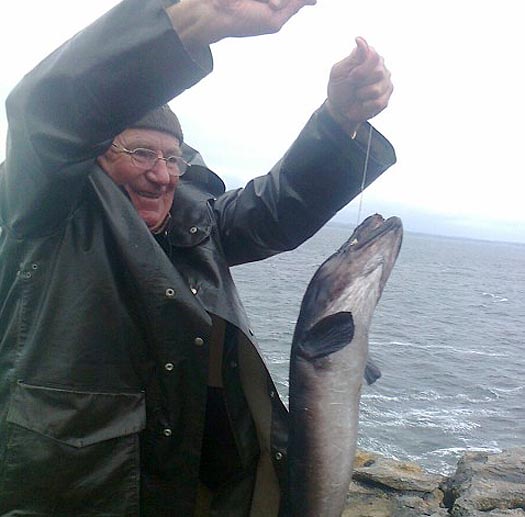
Willie Hartley and the heaviest fish caught in County Clare
Anglers are enthusiastic sportsmen and women, as well as children and around the coast, despite changing weather and river conditions which dictate the type of fishing and species which can be caught. Weather for November has generally been kind to anglers so far with plenty of activity both in freshwater and at sea. Prospects continue to look reasonably good although, the forecast is for colder days ahead, according to Inland Fisheries Ireland. At sea, flounder fishing is becoming popular at this time of year, with good catches reported from the East Coast and North Clare where conger up to 10 kilos have been caught from rocks with Willie Hartley catching the heaviest fish of 10.6 kgs for this year in the local club, as you can see in the accompanying photograph from Ken O'Neill and Inland Fisheries Ireland. Cork Harbour anglers have reported an increased level of cod.
My Book Choice – IRELAND'S ATLANTIC SHORE
Photographer Valerie O'Sullivan has captured stunning images of Ireland's Atlantic shore and the seven counties and people from Mizen to Malin whose shores are touched by this ocean in this book.
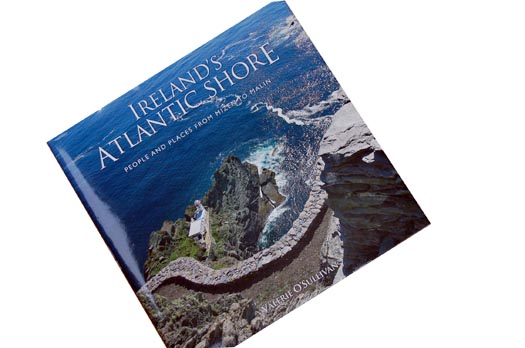
Accompanied by script observations, the beauty of this rich landscape comes across, as well as the life and activities surrounding the sea in those counties, including regattas, festivals, pilgrimages, even fair days, as seen by fishermen, farmers, windsurfers and tourist visitors. Valerie is a full-time photographer based in Killarney and a regular contributor to the Irish media. Her work has won many awards. Her striking images capture the essence and unpredictability of the Atlantic Ocean as it embraces Ireland.
• Published by Collins Press in hardback at €24.99.
• Your comments on THIS ISLAND NATION are very welcome. Email: [email protected]
• TWITTER @TomMacSweeney
Hybrid Car Carriers, Whales, Sea-Sickness & Preserving Island Life
#maritimenews – The world's first hybrid car carrier, whale trouble in Baltimore, is it safe to live near the water, 'heave ho' the stomach, preserving island life read more in THIS ISLAND NATION ....
SEASICKNESS – HEAVE HO!
SEASICKNESS, mal de mer, is without doubt the curse of sea-going and has, at some time, had an effect on most sailors, myself included. Away back in 1897 Thomas W.Knox, writing in 'How to Travel,' advised: "Many persons will tell you that it is an excellent thing to be seasick as you are so much better afterwards.." And in 1912 the Scientific American magazine reported: "Perhaps no malady to which mankind is subject is productive of so much real suffering, with so low a percentage of mortality as the affliction known as seasickness," while Milton Berle, the first major American television star, summed up his suffering: "I had mal de mer aboard a yacht. If somebody had killed me I would have made him my sole heir!"
So why are people susceptible to this dreaded problem which has found no answer from the doctors, philosophers and writers who have discussed it for centuries?
The results of a survey of the 223 crews who took part in the last edition of the Global Challenge, the ''wrong-way-round-the world-sailing-race,' as it is known because it goes against the prevailing winds, are interesting. It focussed on the penultimate leg of the race across the Atlantic from Boston to La Rochelle in France. I have raced across the Atlantic myself, which can throw up (definitely!) a lot of challenges to one's stomach! Two-thirds of those sailing experienced seasickness. Factors influencing those affected included age – those older than 24 were less susceptible - and gender, more women than men were seasick.
Eighty-four per cent were able to carry out their duties but 16% were so incapacitated that they couldn't. Recovery time varied, the worst cases taking five days. The survey was carried out by Yachting World magazine. It also showed, as old sailors knew best when they worked the square-rigged tall ships, rigged to sail downwind, that point of sailing is most comfortable. An old sailor advised me when I began sailing: "The wind is best coming from behind you!"
LIVING NEAR THE WATER
I live near the water, at Monkstown in Cork Harbour and it has always seemed to me that there is a particular pleasure in being able to do so, to walk along the riverside, to look at boats, at wildlife along the shore. Humankind has always settled habitation near water, for good reasons - transport, the availability of water itself, the food source it provides, but in the wake of 'Superstorm Sandy,' it is interesting to see that public debate has arisen in the USA about why people want to live so close to water.
I recall the words of former President and avid sailor, John F.Kennedy: "We are tied to the sea and when we go back to the sea, whether it is to sail or to watch, we are going back from whence we came."
"Humans have an affinity for water. It is in the genetic makeup of a species first nurtured in the watery womb. In America, it is clear that we find comfort where water flows over the earth," the American media is reporting. "But in these days of collapsed houses, flooded subway tunnels and washed-out roads in Superstorm Sandy's wake why do we build alongside water and crave its attractions because it has a dangerous side, whether it is Sandy; or Katrina that wiped away much of New Orleans; or rivers overflowing their banks in New York. The joy of living near the water is counterbalanced by the devastation it can bring."
"Water surrounding some of our cities is starting to be a liability," said Daniel Stokols, the Professor at the School of Social Ecology in the University of California-Irvine.
MARINE WILDLIFE – BALTIMORE SAGA ENDS IN DISAGREEMENT
There are several locations around the coast where the skeletons of whales are preserved and have provided a beneficial, local economic support through tourist interest. But in West Cork the saga of the fin whale which stranded at Baltimore Harbour in the summer amidst a lot of publicity has ended in disagreement with the towing of the whale carcass to open water between Cape Clear and the Fasnet Rock and sinking it with 3 tonnes of weight attached.
The Irish Whale and Dolphin Group says this ended "any chance of salvaging the skeleton, which we feel is a shame as it could have been a wonderful community resource that would have benefitted local tourism, as well as being a fantastic educational and conservation amenity ".
The IWDG is not happy with what it describes as "a well-orchestrated but ill- informed group across the Bay" that won the "shouting match" and convinced local Cork Co. County representatives to have it removed from the Carthy Islands area, in Roaringwater Bay and towed out to sea. "Some of the arguments for this course of action bordered on the bizarre, but it seems the lobbyists conclusion was that this whale represented a 'toxic' timebomb. Statements made without any evidence ... The reality is that there was no evidence that this carcass was toxic".
SHIPPING – A YEAR TO SALVAGE CONCORDIA
Watching the development of the salvage work at the wreck of the cruise ship Costa Concordia and the court hearing involving its Captain Francesco Schettino, I wondered what he must be feeling when his lawyer asked the media scrum around the Italian courthouse to give some thought to this. The lawyer said the media and the public should have "some human feeling for the Captain" after the stress of the last ten months since the vessel sank in January. "He has a family too and he is suffering, give him at least some human consideration. He has feelings too," the lawyer said. Not many people feel much sympathy for the Captain and the families of those who died are still seeking answers about the sinking. A multinational team of more than 450 specialists has almost completed the stabilisation of the 950-foot long vessel off Giglio Island in Italy anchoring it to the rocky sea shore with four massive cables looped beneath its belly. It will take a year to complete the salvage.
Captain, Francesco Schettino, has accepted blame for causing the disaster in which 32 people died, but says others should share responsibility. The company has denied any responsibility and blamed him solely for the course he took when the Italian cruise ship crashed into rocks. While pre-trial hearings have finished it seems that it will not be until the Spring that a full trial will start.
SHIPPING – WORLD'S FIRST HYBRID CAR CARRIER
The world's first hybrid car carrier has been built by Japanese Mitsubishi Heavy Industries at its Kobe shipyard for OSK Lines and named the Emerald Ace. No association with Ireland in that name! Electricity is generated by a solar power system while the vessel is underway and stored in lithium-generated batteries which provide power so that diesel generators can be shut down in port when zero emissions are generated.
MARITIME TV PROGRAMMES – WILL ISLANDS SURVIVE?
We all live on an island, though a lot of people still don't seem to realise that, but look in from next Monday, November 12, at "AR AN OILEÁN", a four-part documentary series on RTE, exploring what it means to live on islands. Made by Loosehorse productions the series and explores island living in the context of dwindling populations. Despite the difficulties, island people and new residents are determined that they will not go the way of the Blaskets and other islands which became depopulated.
The story is told by islanders like Niamh Ní Dhrisceoil, a young teacher in her twenties who commutes every week from Cape Clear to Ballincollig near Cork City where she teaches and Steve Wing, English-born manager of the world famous Bird Observatory on Cape Clear (both pictured below). They are joined by neighbours and friends who opened their lives to the cameras for a year and by islanders on Inishmaan in the Aran Islands, to show why they believe there is a sustainable way of life on the islands for generations to come.
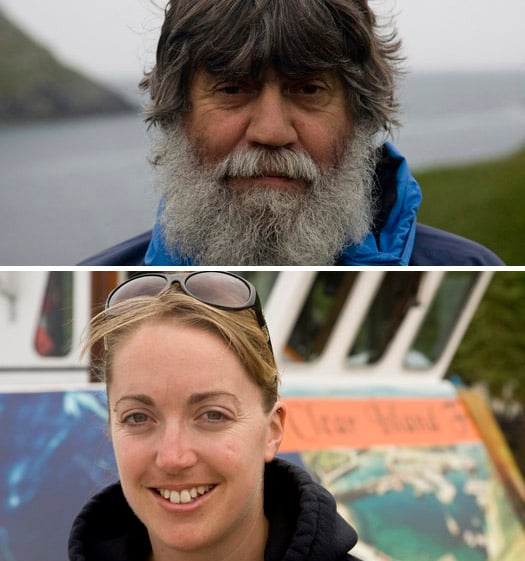
Email your comments on maritime matters to : [email protected]
Follow Tom for more maritime news and comment on Twitter: @TomMacSweeney
Sea Crusades, Shipping Youngsters & A Kilmore Quay Ballad
In THIS 'ISLAND NATION' this week, I invite you to join me on a sea crusade, report that the Shipping Industry should encourage youngsters from Sail Training... A song for the Kilmore Quay fisherman who defied the EU ... 50 years of diving in by Galway university students ... Sunny but cold, the oddest fish in the sea .... More developments on boat security .... Piracy at sea levels fall and Limerick Water Safety Developments ...
JOIN ME IN A SEA CRUSADE
For some time I have been trying to raise interest in the concept of an independent, voluntary organisation to represent the widest interests of the maritime sphere. There has been some support, but it has been limited, despite the fact that over the past few years public interest in Ireland's maritime resources has increased. There is more awareness of the sea and that we are an island. In more and more circumstances, ranging from political to government, commercial, industry, fishing and leisure, I have heard the words used which I spoke for 20 years as a radio presenter: "This Island Nation...."
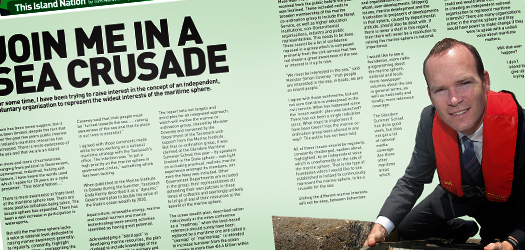
There is more awareness at State level of the maritime sphere now. There are more positive initiatives being taken. The leisure sphere has expanded. There has been a vast increase in participation in watersports. But still the maritime sphere lacks a voice at national level dedicated to raising marine awareness generally, to regularly, constantly, highlighting maritime matters - representing the marine across its widest perspective, from fishing to shipping, the marine environment, to the leisure sector.
My focus is to try to establish a maritime foundation which would do this. If you are interested, read more in the Autumn edition just on sale of Afloat magazine.
SHIPPING INDUSTRY SHOULD ENCOURAGE YOUNGSTERS FROM SAIL TRAINING
The Chief Executive of Sail Training International has told the International Chamber of Shipping that he is surprised "that there has been no systematic attempt by the shipping industry to encourage youngsters who have taken voyages on sail training vessels to seek jobs at sea."
CEO of STI Peter Cardy challenged the shipping industry at its annual conference to take advantage of what he described as "the vast incubator of potential talent" that existed for the shipping industry amongst young people who had shown an interest in the sea by taking a voyage aboard a sail training ship. He is the former Head of the UK Maritime & Coastguard Agency and said that the sail training sector was continuing to grow internationally. There had been 55 sailing vessels from 20 countries and 7,000 trainees of 31 nationalities involved in this year's Tall Ships Race.
"Given the continuing manning crisis in the shipping industry about which we hear I am surprised that there has been no systematic attempt by the shipping industry to encourage a flow of recruits from the sail training vessels."
KILMORE QUAY'S FISHING FACEBOOK
The Kilmore Quay Fishing Fleet has set up its own Facebook page on which Roger McGuire has written and placed via soundcloud.com 'The Ballad of the Saltees Quest,' a tribute to Skipper Jimmy Byrne following his refusal to dump monkfish and landing it on the quayside.
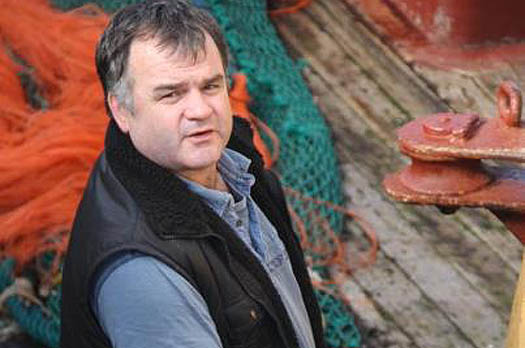
Kilmore Quay skipper Jimmy Byrne
"It's a little tune I threw together in support of Jimmy and the crew who made a stand by landing fish that by some stupid law they would have had to dump at sea. This action put them in danger of legal proceedings against them," says Roger. "I used the melody from an old Irish song called 'The Golden Jubilee'. The lyrics are all my own."
And here's the song!
FIFTY YEARS OF DIVING
The Irish Underwater Council, CFT, is making plans to mark its 50th anniversary next year and a commemorative booklet will be produced by the anniversary date in September 2013. The occasion will be marked on September 28 in the City North Hotel, Gormanstown, Co.Meath. However, one Irish sub-aqua club has already reached its 50th year in existence -
the NUIG/GMIT Sub-Aqua Club which launched its new 6.5m XS-650 RIB Rigid Inflatable Boat, Alice Perry. The club dives locally on a regular basis to such sites as Coral Beach, Bóthar Buí and Killary Fjord. Larger weekend trips also take place to dive sites all along the west coast, from Donegal to Cork. The club is open to all current students, alumni or staff of NUI Galway or GMIT. For further information on the NUIG/GMIT Sub-Aqua Club, or to join, visit www.galwaydiving.com
SUNNY BUT COLD – THE ODDEST FISH
The ocean sunfish is one of the oddest specimens in the seas and is being studied by scientists because of its pattern of swimming at depths as far as 2,000 feet under the surface, but then surfacing to bask on its side where sea birds then snack on parasites clinging to the sunfish's rough greyish skin. Basking may be a way for sunfish to thermally recharge themselves as they cannot tolerate prolonged exposure to cold ocean temperatures, according to the scientists. The sunfish is a flat oval shape found in tropical and temperate oceans, though an occasional one has been reported in Irish waters in recent years, seen as an indication of changing ocean temperatures.
Its scientific name is 'mola mola.' Mola is the Latin word for millstone and accurately describes the flat oval shape of this fish, the heaviest- known bony fish in the world. Bony means that their skeletons are composed of bones instead of cartilage. The weight of an average adult sunfish is about 2,000 pounds. The heaviest known sunfish weighed close to 5,000 pounds.
They eat mostly jellyfish but will also eat small fish, plankton, squid and crustaceans. Sunfish meat is not widely consumed by humans although considered a delicacy in some parts of the world such as Japan, Korea and Taiwan.
BOAT SECURITY
Following my report about boat and equipment thefts Kevin Hennessy has been in touch with me from Youghal where he heads up BoatWarden International Ltd., an Irish-designed and developed product, with all components sourced and assembled in County Cork.
"BoatWarden is a security and management system for small ribs to yachts. Some of the features we cover are - intruder alerts, high water in bilges, theft of boat, breaking of moorings, automatically switching on heat and lights, all from your smart phone," he tells me. "Our system will text up to 5 people if there is a problem. There is no annual fee and all our clients use a pay-as-you-go SIM card. We sell our product globally and the UK and Australia would be our biggest markets. We have units worldwide. The theft of boats right now is on the increase."
The company is developing video systems and I will be having a further look at its work in future weeks. It is good to see a Cork company developing responses to the problems of boat theft.
SEA PIRACY LEVELS DOWN
Sea piracy has fallen to its lowest level worldwide since 2008, as policing by international naval forces has deterred pirates operating in the waters off Somalia, new figures from the piracy watchdog this week indicate. The International Maritime Bureau (IMB) said there were 233 actual and attempted attacks on vessels globally in the first nine months of 2012, compared with 352 in the corresponding period last year.
The number of attacks by Somali pirates has fallen, with 70 attacks by the end of September, down from 199 in 2011 and the lowest number since 2009.
LIMERICK WATER SAFETY DEVELOPMENTS
Limerick County Council, in conjunction with Irish Water Safety and Loc8 Code Ltd. have started a pilot project which enables anyone requiring help at any one of 86 ringbuoy locations around the county to direct the emergency services to their position, with an accuracy of six metres. Ringbuoys and their holders along the Shannon River and Estuary, River Mulcair, River Maigue and dozens of other locations popular with members of the public have been fitted with Loc8 codes containing GPS coordinates. The information is accompanied by contact details for the Samaritans' support services to assist in the reduction of suicide through drowning.
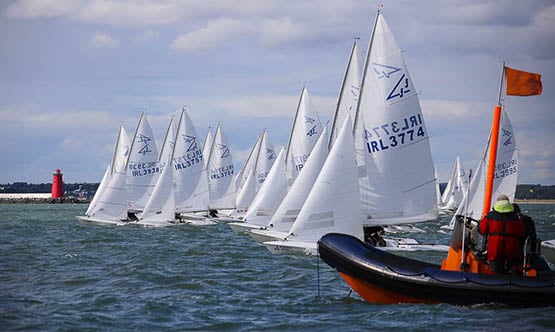
Brian Kennedy, Water Safety Development Officer, Limerick County Council; Cllr Leo Walsh; Con Murray, Limerick Local Authorities Manager; Gary Delaney, CEO Loc8 Code. Photo: Brian Gavin Press 22
Loc8 Codes were originally developed by GPS Ireland, run by former Naval officer and CEO of the company based in Crosshaven, Gary Delaney. "The placing of these codes on ringbuoys and their holders will help to further improve the emergency services' response times when dealing with an emergency incident," he said.
The 86 ringbuoy locations featured in the Loc8 Code pilot project include Castletroy, Foynes, Adare, Annacotty, Pallaskenry, Croom, Glin, Loughil, Askeaton, Castleconnell, Lough Gur, Bruree, Athlacca, Cappamore, Clareville, Montpellier, Murroe, Newcastle West, Pallasgreen, Abbeyfeale, Dromkeen, Bruff and Kilmallock.
Email your comments on maritime matters to : [email protected]
Follow Tom for more maritime news and comment on Twitter: @TomMacSweeney
Marine Journalist Tom MacSweeney Honoured by NUI Galway
#islandnation – NUI Galway have awarded Afloat correspondent Tom MacSweeney an honorary Degree of Master of Science, honoris causa at the Autumn Conferrings today in the Bailey Allen Hall at the University.
Almost 4,000 students will graduate from NUI Galway during the Autumn Conferring Ceremonies which are underway this week (19-26 October). NUI Galway will also confer five Honorary Masters Degrees during the ceremonies on Seán Beattie, Helen Meehan, Josie Sheáin Jeaic Mac Donncha, Tom MacSweeney and Jim Murren.
The Governing Authority of NUI Galway, on the recommendation of the College President, James J.Browne after consideration, awards honorary degrees to a small number of individuals "who have distinguished themselves in various walks of life."
Caught Out by The Tide
#islandnation – Why do people still use a boat when they do not have enough basic knowledge of the movement of tides, sea conditions and the responsibility upon them that, if they go out on the water then they must be able to get back safely to shore themselves?
That question come to mind when examining the RNLI statistics for the past summer during which there were 377 calls for help to the lifeboat service. This was down slightly from 389 in the previous year, but again many of the launches were due to what the RNLI describes as "people getting caught out by the tide, problems with their vessel's engine or machinery and an increasing range of leisure marine activities."
Lifeboat crews have told me privately that there are cases where they feel people are not taking their own safety precautions, not planning sufficiently and not even carrying enough fuel in powerboats or unaware of the basic fact that tide changes can make a return journey longer than an outward one.
The RNLI always responds to calls for help, but while it is good to see more marine leisure interest and use, people must have a basic knowledge of the water if they are to use a boat. There are still too many who do not understand how to behave on the water, who do not know who has right-of-way, when not to be speeding around ports and harbours endangering or inconveniencing others, particularly moored boats and so on. Regrettably, water idiots and water hogs are plentiful in all parts of the coast.
The RNLI figures cover the period June 1 to August 31 2012. The busiest station overall in Ireland was Enniskillen which has two inshore lifeboats on Lough Erne and two Rescue Water Craft. They launched 23 times over the summer. They were followed by Dun Laoghaireand lifeboat crews in Bangor and Portrush who all launched 18 times each. The next busiest station was Baltimore in West Cork. The newly-opened lifeboat station on Lough Ree at Coosan Point in Athlone, which is currently on a twelve month trial, was also busy with nine launches this summer.
Alongside the rescues and calls for assistance there were also a number of tragedies this summer. During one week in August five lives were lost in four separate tragedies off the coasts of Cork, Mayo and Clare. Lifeboat crews were involved in searches with colleagues in the Irish Coast Guard, Garda and Navy divers, sub aqua clubs, local boats and volunteers.
Owen Medland, RNLI Training Divisional Inspector said: "This has been another busy summer for the RNLI despite the unpredictable weather. There have been some stories of incredible bravery and also some stories of devastating loss. In all cases our lifeboat volunteers have shown extreme professionalism and commitment."
There are 44 RNLI lifeboat stations in Ireland with three operating inland at Lough Erne in Enniskillen, Lough Derg in Dromineer and Lough Ree in Athlone.
OPPORTUNITIES FOR A CAREER AT SEA
The National Maritime College of Ireland will hold an open day at Ringaskiddy on Tuesday next, October 23, from 10 a.m. to 3 p.m. when representatives from international shipping companies and maritime organisations will be available to provide information about careers in the maritime industry.
There will be tours of the college including the ship simulators, sea survival centre and engineering workshops. There will also be opportunities to meet maritime companies and organisations as well as presentations on course opportunities at the NMCI. More information by Email: [email protected] or phone 021 4970607.
SALVAGE DISPUTE
The International Chamber of Shipping (ICS), which represents over 80% of the world merchant fleet, is opposing a proposal by the International Salvage Union for new charges for what the Union terms 'environmental salvage', in cases where salvors have carried out operations in respect of a ship or cargo which has presented a threat of damage to the environment. There are also suggestions by the Salvage Union for other alterations to existing salvage rules which are controversial in regard to the opposition by shipowners.
"ICS remains deeply sceptical about the proposal for a separate environmental salvage award, especially as salvage services are already generously rewarded under the present system," the Chamber says. In co-operation with the International Group of P&I Clubs, representing ship insurers, ICS leads shipowner representation on salvage issues, such as in relation to the operation of the Lloyd's Open Form (LOF) – which
The International Union of Marine Insurance has also said that the proposals need further consideration.
LOCK RESTORATION IN NEWRY AND PORTADOWN
The Newry and Portadown branch of the Inland Waterways Association has been doing great work on restoring locks 2 and 3 which had originally I am told been restored by Newry and Mourne Council in the 1990s but had fallen into disrepair.
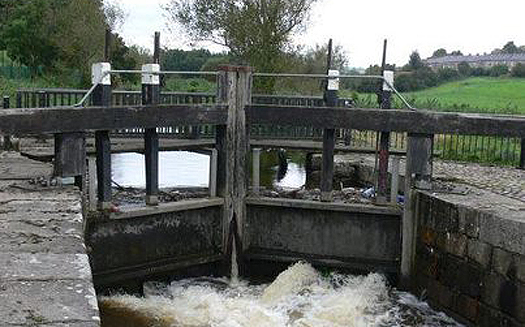
Lock restoration at Newry and Portadown. Photo: IWAI
There has been considerable support for weekend work parties and the rivers agency has also been helpful. It is good to see such dedicated voluntary commitment and there is further work I am told to be done as far as Sand's Mill including debris cleaning and there are hopes that a small boat rally will be possible in the area next month. It is some 50 years since there was boat traffic in this canal area I understand.
HOW MANY SHIPWRECKS AROUND IRELAND?
Just how many shipwrecks are there around the Irish coastline?
That question has been asked of me by readers following my report on the recovery of millions of Euros worth of silver from a shipwreck three hundred miles off the coast and for which Cork port has been used by vessels involved. This is the wreck of the SS.Gairsoppa.
The answer to the question is that there could be somewhere around 15,000 or more shipwrecks around the island of Ireland when the 32 Counties of this island are take into account. There have been official surveys and many books published about Irish shipwrecks, but there is no common agreement about the total number and, from time-to-time, more are located.
Writer Edward Bourke, a maritime historian specialising in the history of shipwrecks around the coastline has written a series of three volumes listing 7,000 wrecks.
"The listing of shipwrecks can never be complete," he said, "because information emerges from new sources regularly and new wrecks are discovered."
A Northern Ireland website, 'My Secret Northern Ireland,' which lists wrecks on that coastline answers the question with three points:
• First, the British have been a traditionally strong seafaring people and most of the routes from Britain to the rest of the world pass either to the north or the south of Ireland
• Second, the waters around the British Isles have seen much fighting at sea especially during the two world wars
• Third, the weather has contributed its own share, more so in older times when sailing ships were more susceptible to the whims of nature
The Department of Environment, Heritage and Local Government in the Republic published the 'Shipwreck Inventory of Ireland,' listing 3,000 vessels which were wrecked prior to 1946 off the coasts of Counties Louth, Meath, Dublin and Wicklow.
Karl Brady who compiled that volume of research work wrote: "As a consequence of the high level of maritime traffic in our seas and the hazards associated with seafaring, a large number of vessels have been stranded or wrecked around our coast. It is estimated that up to 15,000 shipwrecks may lie in Irish territorial waters."
The Department undertook this project to quantify Ireland's maritime heritage and create an archive of all recorded incidences of shipwrecking around our coast. This was valuable research work which, in my view, would help raise awareness generally of the maritime sphere and the historic and cultural importance of the various elements of our maritime heritage. As in other aspects of life, the current economic cutbacks may have affected the progress of this research.
In early Summer this year there was considerable interest off Schull in West Cork when the wreck of a wooden merchant ship, believed to date back to the 16th century, was discovered buried into the seabed in 10 metres of water just off the shoreline. It was located during construction work on a waste water treatment plant. The ship's cargo appeared to have included coconuts.
NO PLACE FOR COUNCILLORS
Politicians who are local councillors around the country have been finding the unexpected results of a change of regulations which the Minister for Transport introduced. Its effect, apparently, is that councillors are no longer entitled to be nominated as members of the boards of port companies. Board members are being appointed directly by the Minister according to local politician. In Cork I have been told by some of them that they think it is a blow to local democracy that what they saw as a longstanding link between the views of the public expressed through them and the port company has been lost. The port is a vital part of Cork economic life and the loss of the presence of local councillors does raise issues of democratic representation on such an important body.
Email your comments on maritime matters to : [email protected]
Follow Tom for more maritime news and comment on Twitter: @TomMacSweeney
In This ISLAND NATION this week .. Protect yourself against Eastern European boat thieves .... EU shambles as hundreds get free monkfish in Kilmore Quay ... Limerick invention for disabled sailing .... $31m. dollars paid for ship damage to a reef .... Coast Guard called to answer in battle for coastal radio stations' survival .... Marconi Heritage Weekend in Clifden...
SURVIVING A BREAK-IN TO YOUR BOAT
To find your boat broken into, smashed apart inside, treasured items destroyed, to discover what has been stolen, what had been a home on the water reduced to a debris-littered site of destruction, mounts up to a personal blow that can be heart-breaking. That happened to me when SEASCAPES my Sigma 33 was broken into, robbed and badly damaged on its mooring at Crosshaven. So the warning from the President of the International Association of Marine Investigators should be taken seriously – Eastern European criminal groups are targeting Ireland and are prepared to travel thousands of miles to rob Irish boats and steal maritime equipment.
Simon Lofting was quite blunt at the meeting of the Association in Cork where he said that these groups first reconnoitre an area they intend to target and then move in. Sgt. Liam Grimes of the Garda Water Unit echoed this warning, advising Irish boat-owners to improve their security to prevent marine equipment.
The theft of outboard engines has become highly organised, with the more powerful, expensive ones being particularly targeted. Crime groups, according to Simon Lofting, have created fake serial numbers for stolen engines and boats, some of which were later used in other criminal activities including drug-smuggling. Boat-owners have been advised to ensure they have photographs of their boats, engines and other equipment, with serial numbers recorded and, of course, don't keep those numbers aboard the boat itself.
After my boat was robbed the Gardai in Cobh recovered some of the items stolen and I was told that a gang had been active in Cork Harbour. Quite a lot of other equipment was recovered but, while I could identify what had come from my boat having kept records, it was not clear that other owners could do the same. I never did hear what eventually happened to those who had been apprehended and charged by the Gardai, but at least the keeping of records proved effective.
HUNDREDS GET FREE FISH IN KILMORE QUAY
The sight of hundreds of people on the quayside at Kilmore Quay taking free monkfish underlined the shambles of the European Union's Common Fisheries Policy. To land the fish broke the quota regulations imposed by desk-bound bureaucrats in Brussels who have never felt a deck heave under them on the fishing grounds. This is one of the problems with the EU. Those imposing regulations do not have sufficient practical fishing experience. Stocks must be protected. That is also in the interests of fishermen. If there are no stocks they have no future. A number of existing protection programmes were devised and implemented by fishermen. But there has not been enough public support or attention given to the industry which is more highlighted in the media at time of tragedy. The background of some of the anti-fishing industry environmental lobbying organisations should be questioned as strongly as the fishermen and fishing organisations are and their credence and level of support authenticated. While the landing of the expensive and highly-valued monkfish was a breach of the fishery laws, the reaction of the Sea Fisheries Protection Authority was predictable – prosecution of Irish fishermen. Why is the same level of prosecution not evident in other EU countries?
There is surely, another aspect of criminality – that which is against human interest. The EU has forced the dumping of fish at sea. Fish do not choose the nets they are captured in, though there can be questions about the type of nets and the location of fishing. However, the EU has talked nonsense for years as fishermen pointed out the absurdity and abuse of stocks by the forced dumping of fish and proposed systems where what is caught would be landed, with appropriate controls applying for the disposal or sale of the landings.
EU policies on fishing are a shambles, the failure for which those responsible should be brought to account. There are so many regulations damaging the fishing industry rather than helping it that they are too numerous to be even able to record them all. The Spanish industry has had too much influence, some would claim even control, of EU fishing policies for too long. The French ignore the EU and do things their own way. Once again, it is Ireland which does what the EU tells it to do.
As a renowned Irish rugby international once put it to his team in public: "Where is your pride....???"
Interview with the skipper on RTE Morning Ireland here
LIMERICK INVENTION FOR DISABLED SAILING IN EUROPEAN AWARDS
A new invention by a 23-year-old University of Limerick student to give independence to disabled sailors has been included in the global semi-finals of the 2012 James Dyson award. The 'Thadeus' chair-system enables disabled sailors to get in and out of sailing dinghies safely, independently, with more ease and dignity. 23-year-old Harry de Stacpoole who has completed a Bachelor Degree in Product Design and Technology at the University of Limerick invented 'Thadeus' after working as an instructor with disabled sailors. He felt that the only time wheelchair users were completely independent was on the water but that existing systems removed that independence. So he worked on devising a system that would provide safe transfer from a wheelchair into a sailing dinghy without assistance.
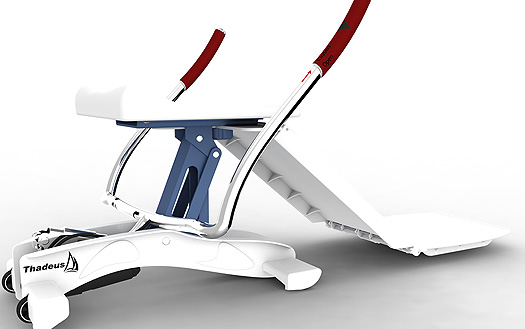
The Thadeus disabled sailing invention
"Whilst lowering themselves in the 'Thadeus' seat their legs extend and can be placed into the dinghy once the seat has been fully lowered. For reversing the process, the principles remain the same."
A number of Irish sailing clubs offered Harry the use of their facilities, dinghies and pontoons to develop his concept. Once his invention reached prototype stage, he carried out testing with sailors who had disabilities. "Their feedback was critical to the final success of Thadeus." It was on display at the London Paralympics and received a lot of interest. "The aim of Thadeus is to improve the appeal of sailing for the disabled to a wider and more inclusive range of people. I hope it will be instrumental in sailing gaining the leading edge in sport for "all-inclusiveness".
Thadeus is one of three Irish inventions that have beaten off stiff competition from over 500 entries worldwide to make the global semi-finals of the prestigious James Dyson award. It will go before an international judging panel on October 18 to select fifteen finalists from which the overall winner will be chosen on November 8.
BATTLE FOR THE FUTURE OF THE COASTAL RADIO STATIONS
I am told that Captain Chris Reynolds, Director of the Coast Guard, is expected to appear before the Oireachtas Transport Committee on October 24. It appears that Senator Mark Daly has succeeded in getting a hearing about the proposals by Coast Guard management to close Valentia and Malin Coastal Radio Stations and centralise the service in Dublin, where it was also suggested that a support station to the main Dublin centre would be located in the constituency of the Minister for Transport in Blanchardstown. With a political row on-going about the location of health facilities in the constituency of the Minister for Health - though the reasons for this are different – and concern about the downgrading of rural areas, this whole affair could assume major proportions. However it has to be said that the national media is not giving it enough attention. There are serious issues about safety at sea involved.
As far as I remember the last time the Coast Guard had to defend a proposal in this manner was back in July 2008 when Minister Noel Dempsey, then responsible for the marine and Coast Guard management were also then trying to shut down the coastal radio stations.
That was a bit of a turning-point in that proposal which was shown to have a number of shortcomings - the basis for the proposal and the facts quoted became public issues. Eventually Noel Dempsey and Coast Guard management were faced down and had to admit defeat. It will be interesting to see what happens this time, but what has been disclosed of the background to the current closure attempts through freedom of information requests raises many questions about the management proposals. October 24 should be an interesting day at the Transport Committee.
$31m. SHIP COMPENSATION TO NEW ZEALAND
Daina Shipping, a subsidiary of Greece-based Costamare, along with its insurers have agreed to pay the New Zealand government up to $31.5 million for clean-up costs after its cargo ship, Rena, ran onto the Astrolabe reef near Tauranga on a calm night last October. It spilled hundreds of tons of oil and killed thousands of sea birds in what authorities described as New Zealand's worst maritime environmental disaster.
The reef is near popular swimming and surfing beaches. $22.9 million is for oil clean-up costs incurred so far and another $8.6 million if the shipping company doesn't remove pieces of the wreck still on the reef. The New Zealand Government claims that the disaster has cost it $38.9 million. Maritime laws limited Costamare's financial liability.
MARCONI HERITAGE WEEKEND
Marconi Heritage Weekend will take place this coming weekend in Clifden, Co.Galway. It will start on Friday, October 12. The programme will include lectures and discussions about the Clifden Marconi Research Station Project, visits and walks around the locations associated with the history of the development of wireless transmissions from Clifden and reveal new insights into the little-known Letterfrack Receiving Station. The Radio Officers' Association is supporting the weekend.
Email your comments on maritime matters to : [email protected] or @TomMacSweeney on Twitter



























